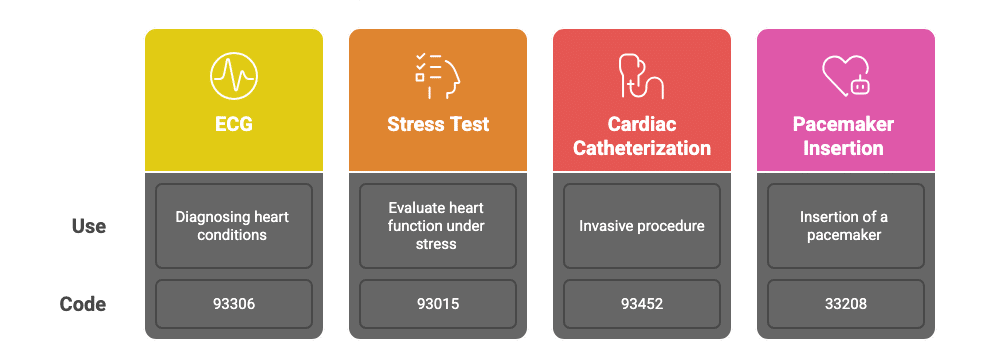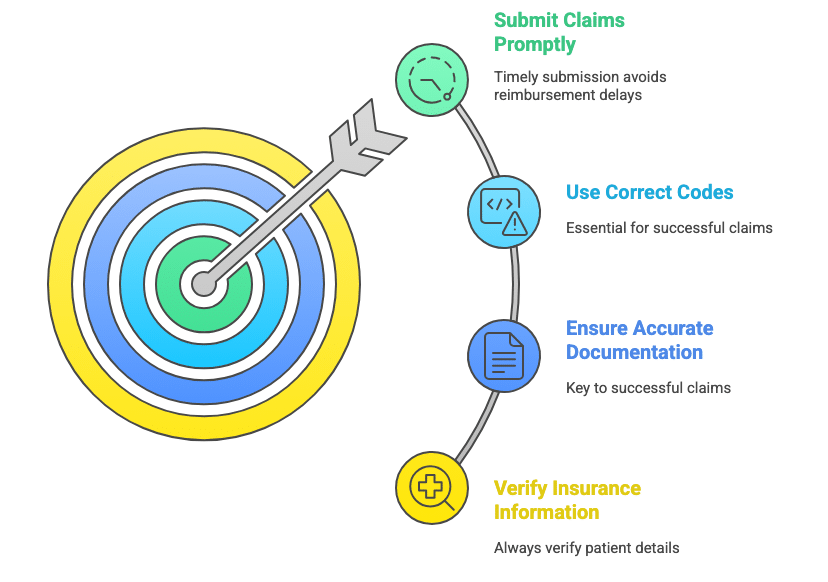
Managing a cardiology practice involves more than just providing excellent patient care. It requires a comprehensive understanding of cardiology medical billing services, from accurate coding to efficient claim tracking. At Gables Medical Billing, we specialize in helping cardiology practices streamline their billing processes, ensuring that they receive the compensation they deserve. In this guide, we’ll explore the essential components of cardiology billing, providing you with expert insights and actionable tips to enhance your practice’s financial health.
Understanding Cardiology Services and Codes
Cardiology is a complex field, and the billing process can be equally intricate. Properly understanding and utilizing cardiology coding practices is crucial for accurate billing. Here, we’ll break down some of the common cardiology services and their associated codes.
Common Cardiology Services and Codes

Common Cardiology Services and Codes
- Echocardiograms (ECG): These tests are vital for diagnosing heart conditions. The ECG CPT codes such as 93306 (Doppler echocardiography) are frequently used.
- Stress Tests: These tests help evaluate how the heart functions under stress. Common codes include 93015 for cardiovascular stress tests.
- Cardiac Catheterization: This invasive procedure is coded with 93452 for left heart catheterization.
- Pacemaker Insertion: Codes like 33208 are used for the insertion of a pacemaker.
Understanding these codes is essential for avoiding billing errors and ensuring that claims are processed smoothly.
Efficient Charge and Consent Tracking
Accurate charge capture and consent tracking are fundamental to effective billing. Without these, practices may face revenue leakage or compliance issues.
Best Practices for Charge Tracking
- Automate Processes: Utilize electronic health record (EHR) systems to automatically capture and track charges.
- Regular Audits: Perform regular audits to ensure all services provided are billed correctly.
- Staff Training: Train staff on the importance of accurate charge capture and the use of EHR systems.
Importance of Consent Tracking
Consent tracking is equally important, especially for procedures that require explicit patient approval. A robust consent management system ensures compliance and protects the practice from legal challenges. Use digital consent forms to streamline this process and maintain accurate records.
Claims Preparation Tips
Preparing claims accurately is vital to ensure timely reimbursement. Here are some expert tips for effective claims preparation:
Steps for Accurate Claims Preparation

Steps for Accurate Claims Preparation
- Verify Insurance Information: Always verify patient insurance details before providing services.
- Ensure Accurate Documentation: Complete and accurate documentation is key to successful claims. This includes detailed notes on services rendered.
- Use Correct Codes: As discussed earlier, using the correct codes is essential. Double-check codes before submission.
- Submit Claims Promptly: Timely submission of claims helps avoid delays in reimbursement.
By following these steps, practices can minimize claim rejections and improve cash flow.
Denial Management for Specialty Care
Denial management is a critical component of cardiology billing. Understanding why claims are denied and how to address these issues can significantly impact a practice’s financial health.
Common Reasons for Denials
- Incorrect Patient Information: Errors in patient demographics can lead to denials.
- Authorization Issues: Failing to obtain prior authorization can result in claim denials.
- Incorrect Coding: As mentioned, using incorrect codes is a common reason for denials.
Strategies for Effective Denial Management
- Identify Trends: Regularly review denial patterns to identify common issues.
- Appeal Denied Claims: Develop a robust appeals process to address and resolve denied claims.
- Educate Staff: Train staff on common denial reasons and strategies for prevention.
Implementing these strategies can help reduce the rate of denied claims and improve overall revenue.
Tracking Outcomes and Improving Workflows
Tracking outcomes and optimizing workflows are essential for maintaining the efficiency and profitability of a cardiology practice. Here’s how you can achieve this:
Importance of Outcome Tracking
Outcome tracking helps practices understand the effectiveness of treatments and identify areas for improvement. Use data analytics to monitor patient outcomes and adjust treatment plans as necessary.
Improving Workflows
Streamlining workflows can significantly enhance practice efficiency. Consider the following approaches:
- Implement Technology: Use technology to automate routine tasks, reducing the burden on staff.
- Optimize Scheduling: Efficient scheduling can minimize wait times and improve patient satisfaction.
- Enhance Communication: Clear communication between staff and patients can prevent misunderstandings and improve care delivery.
By focusing on these areas, practices can improve both patient care and financial performance.
Conclusion
In conclusion, effective management of heart clinic billing is essential for the success of any cardiology practice. By understanding cardiology coding practices, maintaining accurate charge and consent tracking, preparing claims correctly, managing denials efficiently, and optimizing workflows, practices can enhance their financial health and continue to provide high-quality care. At Gables Medical Billing, we are committed to supporting cardiology practices with expert billing services tailored to their unique needs. For more information on how we can assist your practice, please visit our website.
Let us help you navigate the complexities of cardiology billing so you can focus on what you do best—caring for your patients.

